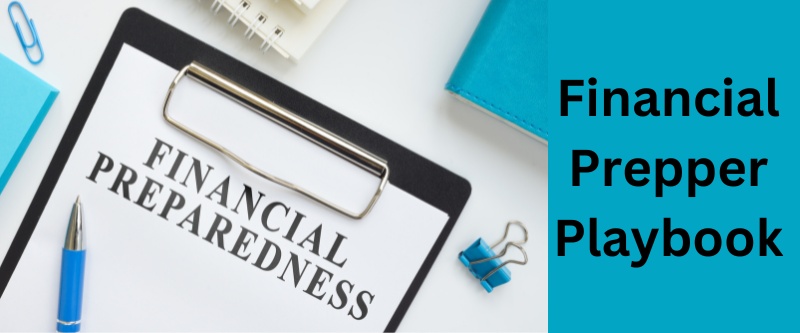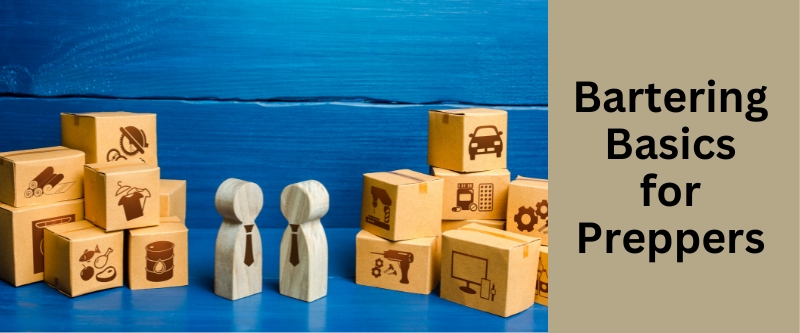Strategies for Pre, Mid, and Post-SHTF
Table of Contents
Introduction
In the area of preparedness, careful planning for various disaster scenarios is important. But one aspect that often gets overlooked is financial preparedness. Securing tangible resources such as food, water, and shelter are understandably top of mind but too often these concerns put thoughts of financial resilience to one side.
Financial resilience isn’t just about having savings or the money it takes to provide for food, water and shelter. It is also about understanding the economic landscape as it gets impacted by the short term or long term disaster the prepper is preparing for.
Whether it’s a transient disruption or a prolonged societal upheaval, the prepper’s financial stability can be a critical determinant of resilience and eventual recovery. So, here we take readers through aspects of financial preparedness across the crisi, from anticipation to aftermath.
Pre-SHTF: Laying the Groundwork
Nobody can tell the future but the prepper is concerned about facing a wide range of potential disasters. And it is certainly safe to predict that actual events will come in somewhere along that range.
At one end of the range are two predictable scarios. These are 1) a short term local happening, like a natural disaster and 2) a typical cyclical economic downturn. The effects of these on the prepper run the gamut from financial hiccup to severe financial loss.
At the other end of the range is the scenario of a complete financial collapse of the national economy caused by an economic meltdown of some kind. The effect of this kind of event on the prepper is potentially catastrophic.
Scenario 1: Temporary Disruption
In the “temporary disruption” scenario, there is every expectation that things will return to normal fairly soon.
Nature of Short-Term Disruptions
From sudden stock market crashes to abrupt geopolitical events, short-term disruptions are like financial earthquakes. They aree unexpected, intense, but with the right preparations, survivable.
- Economic Downturns: Often triggered by external events, these can lead to job losses, reduced consumer spending, and a general sense of financial unease. Families may face hardships, businesses may close their doors, and communities may struggle.
- Natural Disasters: Hurricanes, earthquakes, or floods can disrupt local economies and affect personal finances. They can also have long-lasting implications on the financial health of a region.
Financial Implications
In these scenarios, the financial world seems to be on a roller coaster. But with the right seat belt, you can ride it out.
- Market Volatility: Stocks might plummet, and your 401(k) might take a hit. But history shows that markets do recover. The key is not to make hasty decisions but rather act on the long-term understanding that markets are inherently cyclical.
- Supply Chain Disruptions: When trade routes are affected, the price of goods can soar. This can lead to inflation, where your dollar buys less than it used to. In a globalized world, a disruption in one part of the world can have a ripple effect, impacting economies thousands of miles away.
Preparatory Steps
- Emergency Fund: You need to have a financial bunker. In uncertain times, having 6-12 months of expenses covered can provide peace of mind. This is to give yourself the freedom to make decisions without financial panic.
- Diversify Investments: Don’t put all your eggs in one basket. Consider bonds, stocks, and even international investments. Diversification is the foundation of a financial strategy that ensures that a downturn in one sector doesn’t doom your entire portfolio.
- Stay Updated: Subscribe to financial news outlets, join forums, or engage in community discussions. Being informed is the key to better decisions, so long as you do not blindly follow the crowd.
Scenario 2: Complete Financial Collapse
This is the scenario that keeps preppers up at night. It’s the financial equivalent of a long winter, where the norms of the old world no longer apply. The fabric of our financial institutions has unraveled and our trust in them has gone. The world’s financial rules have changed, and our adaptability becomes the key to survival.
Signs of an Impending Collapse
- Hyperinflation: When a loaf of bread costs a wheelbarrow of money, you know you’re in troubled waters. Hyperinflation destroys the purchasing power of money and destabilizes economies.
- Bank Failures: When banks close their doors, and people can’t access their money, panic follows. It’s a domino effect, where one bank’s failure can lead to a cascade of collapses across the financial sector. Economies are built on trust and confidence.
- Global Distrust: If international investors pull out, it’s a sign that they’ve lost faith in the country’s economy. This isn’t just about numbers; it’s about confidence. When global players lose confidence in an economy, it can lead to a rapid downward spiral.
Immediate Aftermath
- Barter Systems: With paper money worthless, goods and services become the new currency. It’s a return to the basics, where value is determined by immediate utility rather than abstract numbers.
- Gold and Silver: Precious metals might become the standard for larger transactions. Their intrinsic value, which has been recognized for millennia, becomes paramount in a world where paper currencies are in flux.
- Localized Economies: Communities might form their own micro-economies, with localized currencies or trade systems. In the absence of a centralized financial system, local communities become the new foundation of trade and commerce.
Preparatory Steps
What should the prepper do to prepare for this?
- Tangible Assets: Invest in land, livestock, stocks of food and water and tradable durable goods. These are a store of value when paper money has become worthless. It’s all about having assets that hold intrinsic value. These assets can provide, shelter, nourish, or facilitate trade.
This would be a good time to consider investing in a remote bug-out location.
- Reduce Debt: In uncertain times, being debt-free can provide flexibility and security. Debt can be an anchor, weighing you down. In times of financial turmoil, being free from this burden can provide the agility needed to navigate the storm.
- Community Building: Form or join local groups. There’s strength in numbers, and community support can be invaluable. Where centralized systems falter, local communities are sources of mutual suppor and facilitate trade.
Mid-SHTF: Navigating the Crisis
Finding your way through the financial SHTF-show will come down to:
- Bartering
- Asset Protection
- Adapting
Let’s look at each of these.
The Bartering Economy
With the death of traditional currency, trade gets conducted through bartering. This is a system that’s as old as civilization itsel. But we need to understand it.
The Resurgence of Bartering
Historically, societies without standardized currency relied on bartering. In modern SHTF scenarios, with the possible collapse of traditional currency, bartering can once again become essential.
- Why Barter? It’s direct, tangible, and doesn’t rely on a third-party system. It’s about exchanging value for value, and it bypasses the need for a standardized currency. In a world where trust in established systems erodes, direct exchanges between individuals or communities become the backbone of commerce.
- Trust and Community: Bartering thrives in environments where trust is established. It’s not just about trade; it’s about mutual respect and understanding. Building and maintaining trust is paramount, especially when the usual guarantees and protections might be absent.
Precious Metals in Bartering
Metals like gold and silver have historically held value, making them ideal for trade in uncertain times.
- Valuation: Familiarize yourself with the weight and purity of metals to ensure fair trades. If you rely on precious metals for trade, you must understand their intrinsic value.
- Trading Tips: Coins or small denominations are more versatile than large bars. You must be able to trade at varying scales, from minor day-to-day exchanges to significant transactions.
Bartering Skills
In a barter economy, skills can be as valuable as tangible goods.
- Medical Expertise: Being able to treat injuries or illnesses is a tradeble skill.
- Farming and Food Production: Growing food or raising livestock ensures your own self-sufficiency and offers opportunity for trade. Pro tip: consider this when investing in your bug-out location.
- Mechanical and Repair Skills: Just as with medical expertise, the ability to fix inanimate things is tradeable. In a post-collapse world, the emphasis shifts from buying new to repairing and maintaining what you already have.
Bartering Etiquette and Safety
Trading in uncertain times requires caution and respect.
- Fair Trade: Ensure trades are equitable. Building trust is essential for future transactions. It’s about creating long-term relationships, not just one-off exchanges.
- Safety Precautions: Trade in familiar areas, preferably in groups. Always be cautious and avoid potentially dangerous situations. Both parties should feel safe and respected during the trade.
- Documentation: Keeping records of trades can help avoid disputes and ensure clarity in recurring transactions. In a world without formal systems, self-maintained records are a good idea.
- Related post: Bartering Basics for Preppers
Asset Protection
As a crisis approaches you need to look at safeguarding your assets. As the world around you changes, the value and importance of the various assets you have might shift dramatically. It’s not just about protecting your wealth; it’s about ensuring that it best serves your survival and that of your family.
- Diversification: The importance of spreading your investments across different asset classes has always been understood. By diversifying, you reduce the risk of a total loss and increase the chances of having some assets that retain or even increase in value.
- Reallocation: In an approaching crisis, you might consider selling stock and investing the proceeds in a bug-out location and doubling down on your emergency food supply. These two new assets directly contribut to the survival of you and your family..
- Physical Security: Tangible assets, especially precious metals, food, tools, or other valuable commodities, become prime targets during tumultuous times. So make sure they are secured. This might involve using safes, hidden compartments, or even creating caches in remote locations.
- Digital and Intangible Assets: In today’s digital age, many of our assets are intangible. Cryptocurrencies, digital files, online bank accounts, and more need their own kind of protection. Regularly updating passwords, using secure networks, and backing up digital data in offline formats can be essential steps in safeguarding these assets. Of course, this assumes that such assets even exist in a post-SHTF world. In our opinion, digital assets are best liquidated and the proceeds reallocated to tangibles.
- Insurance and Documentation: While insurance might seem irrelevant in a full-blown crisis, in more temporary or localized emergencies, it can play a pivotal role. Ensure that your insurance policies are up-to-date and cover the most likely risks. Additionally, having clear documentation of your assets can aid in claims or disputes that might arise.
- Mental Preparedness: Protecting assets isn’t just a physical or logistical challenge; it’s a mental one. Being mentally prepared for the potential loss, understanding the fluid nature of value, and being ready to make tough decisions on the fly can be just as crucial as any physical preparations. We discuss this here: Physical and Mental Fitness for Preppers.
Adapting to the New Economic Landscape
As the dust settles and the immediate threats of crisis wane, a new economic reality will emerge. This reshaped landscape may well bear little resemblance to what was once familiar. So adapting to it becomes necessary for continuing survival and eventual prosperity.
- Staying Updated: The post-crisis economic landscape will be volatile andrapid- shifting. So you need to keep your finger on the pulse of change. You will need to be more attentive to this now than you were before. Keep updated on market trends, currency values, and emerging trade practices. Everything will be in flux, so you need to be very cautious.
- Networking: When traditional economic infrastructures have been compromised, we must rely heavily on personal connections. A network of trusted individuals can facilitate trade, provide insights, and offer mutual support. These networks can be the foundation of new business ventures, trade routes, or collaborative survival strategies.
- Understanding New Currencies: Post-crisis, the traditional currency might be devalued, replaced, or even abandoned. Whether the new medium of exchange is a different national currency, a local barter token, digital currency, or a return to precious metals, understanding and adapting to this new system is crucial.
- Seeking Opportunities: Every crisis, no matter how dire, presents unique opportunities. The post-SHTF economic landscape will have its own set of needs and demands. Identifying these can lead to profitable ventures.
- Re-evaluating Value: In a changed world, the concept of value itself might shift. Items or skills that were once taken for granted could become highly sought after, while previously valuable commodities might lose value.
- Education and Skill Development: The post-crisis world might have new demands for skills and expertise. There could be opportunities in new farming techniques, lalternative energy sources, or post-crisis financial management. So invest in education and skill development.
Post-SHTF: Picking Up the Pieces
The immediate crisis has subsided, but the world that emerges might be starkly different from the one we knew. This phase is about recovery, adaptation, and building a foundation for a new future.
Reassessing Financial Health
Once the SHTF crisis has subsided, we will need to take a moment to breathe, reflect, and evaluate. The financial landscape will likely have changed. How different it will be, we can’t predict. But we will need to understand it before we can rebuild.
Asset Evaluation
Begin by taking inventory of your assets. This isn’t just about counting coins or measuring land; it’s about understanding the ivalue of what you possess in the context of the new world. For example:
- Tangible Assets: Property, livestock, precious metals, and other physical goods should be evaluated not just for their current market value, but for their utility and potential future worth.
- Intangible Assets: Stocks, bonds, digital currencies, and other non-physical assets may have undergone significant changes in value
Debt Landscape
The nature of debts and obligations might have changed post-crisis. Interest rates, loan terms, or even the very existence of some financial institutions might have shifted. Reevaluate all your debts, understanding:
- Changed Terms: Some loans or credit lines might have revised terms, either due to economic shifts or institutional changes.
- Opportunities for Settlement: In some cases, creditors might be willing to negotiate or settle for reduced amounts. After all, they too are trying to stabilize in the post-crisis world.
- New Obligations: Be wary of new debts or financial obligations that might have arisen due to the crisis, such as repair costs, medical bills, or community levies.
Income Streams
Your primary source of income before the crisis might no longer be viable. Assess the stability and reliability of your current income sources and explore opportunities for diversification. This could involve:
- New Ventures: The post-crisis world will have new needs, and catering to these can be a source of income.
- Skill Monetization: Skills like repair, medical expertise, or teaching can become valuable commodities in a recovering world.
Expense Analysis
Just as income might have changed, so too might your expenses. Some costs might have increased, while others could have decreased or disappeared. Create a new budget, factoring in these changes. Identify areas where you can save or need to allocate more resources.
Adapting to the New Economy
A significant crisis can reshape the very fabric of an economy. Traditional financial systems, trade practices, and even the value of currency may have been transformed. We need to understand this.
New Currency Landscape
This medium of trade and commerce might have evolved.
- Government-backed Currency: If the traditional currency has been devalued, a new one might be introduced by the government. Understand its value, acceptance, and how it compares to other global currencies.
- Digital and Cryptocurrencies: In a world moving towards digitization, cryptocurrencies might gain prominence. Familiarize yourself with the most stable and widely accepted digital currencies, their trading platforms, and their implications for privacy and security.
- Community Currencies: In some regions, communities might develop their own localized currencies or trade tokens. Engaging with local community leaders and businesses can provide insights into the value and acceptance of such currencies.
Investment Opportunities
Every crisis presents opportunities and new avenues for growth and investment.
- Infrastructure Rebuilding: Post-crisis periods often see a surge in infrastructure projects, be it roads, communication networks, or public utilities. Investing in these can be lucrative.
- Technological Innovations: Crises often accelerate technological advancement. Stay updated on emerging technologies, especially those that address the challenges posed by the crisis.
- Emerging Sectors: New challenges lead to new solutions. Sectors like renewable energy, sustainable agriculture, or telemedicine might see rapid growth. Identifying and investing in startups or established players in these sectors could offer great returns.
Trade and Commerce Dynamics
The way businesses operate and trade can change post-crisis.
- Supply Chain Reshuffling: Global supply chains might be restructured, leading to shifts in import-export dynamics. This can influence the prices of goods and the profitability of certain business sectors.
- Local vs. Global: Depending on the nature of the crisis, there might be a renewed emphasis on local production and consumption. Understanding this dynamic can guide investment and business decisions.
- Regulatory Changes: Governments might introduce new regulations to stabilize the economy or prevent future crises. Staying informed about these can help in compliance and identifying business opportunities.
Financial Education and Consultation
The new economic landscape can be complex and challenging to navigate alone.
- Financial Advisors: Consider consulting with financial experts who have a grasp of the post-crisis economy. They can offer tailored advice, investment strategies, and risk mitigation techniques.
- Workshops and Seminars: Attend workshops or seminars that focus on the new economic dynamics. These can provide insights, networking opportunities, and practical skills for financial management.
Building for the Future
Emerging from the shadows of a crisis, we must both adapt to the present and build for the future. This phase is about planning, applying lessons learned, and laying a foundation of resilience.
Revisiting Financial Goals
- Short-term Goals: Reassess immediate financial objectives. But, whether it’s rebuilding an emergency fund, clearing off debts, or investing in immediate opportunities, prioritize actions that offer stability.
- Long-term Goals: The crisis might have altered the trajectory of your long-term financial plans. Reevaluate retirement plans, property investments, and other long-term assets.
Skill Enhancement and Education
- Financial Literacy: Enhance your understanding of the new financial landscape. Attend courses, webinars, or workshops that focus on post-crisis financial management.
- Diversifying Skill Sets: The post-SHTF world might value different professional and practical skills. Consider upskilling in areas like sustainable farming, renewable energy technologies, digital marketing, or any other field that promises growth in the new world order.
- Youth Education: Ensure the younger generation is equipped to navigate the post-crisis world. Invest in their education, especially in fields that promise future relevance and stability.
Strengthening Community Ties
- Local Collaborations: Engage more deeply with your local community. Collaborative ventures, in business, agriculture, or technology, can pool resources and expertise and bring stability and growth.
- Community Financial Initiatives: Consider participating in or even spearheading community-based financial initiatives. This could include local investment groups, community banks, or cooperative businesses.
- Knowledge and Resource Sharing: Establish or engage in platforms where community members can share financial advice, investment opportunities, and resources.
Incorporating Technology
- Digital Financial Management: Embrace tools and platforms that allow for efficient financial management, budgeting, and investment tracking in the digital age.
- Online Trading and Investments: Familiarize yourself with online trading platforms, especially if they’ve gained prominence post-crisis. This can open up a world of global investment opportunities.
- Blockchain and Cryptocurrencies: If digital currencies have re-established themselves/gained traction post-crisis, consider taking advantage of this technology.
Embracing Sustainability
- Sustainable Investments: Focus on sectors that prioritize sustainability, be it in agriculture, energy, or manufacturing. These are likely to be more resilient in the face of future challenges.
- Personal Sustainability: On a personal level, consider adopting practices that ensure long-term sustainability. This could involve setting up a home garden, investing in solar energy, or even rainwater harvesting.
Community and Collaboration
In the aftermath of a crisis, the role of community becomes very important. Collective strength, shared resources, and mutual support can significantly accelerate recovery and lay the foundation for a resilient future.
Here’s how to harness the power of community collaboration in the post-SHTF world.
The Power of Local Economies
- Supporting Local Businesses: Prioritize purchasing from local vendors, artisans, and farmers. This strengthens the local economy and ensures that money circulates within the community. This fosters growth and stability.
- Community Markets: Consider establishing or participating in local markets where residents can trade goods, services, and share knowledge. These platforms can become hubs of innovation, trade, and mutual support.
- Local Currency or Trade Tokens: Some communities introduce their own local currencies or trade tokens post-crisis to stimulate local trade and reduce dependency on unstable national currencies.
Collaborative Ventures
- Pooling Resources: Form alliances with neighbors or community members to pool resources. This could involve joint agricultural ventures, shared storage facilities, or collective purchasing of essential goods in bulk.
- Skill Exchange Programs: Establish platforms where community members can offer their skills in exchange for goods or other services. For instance, a mechanic might fix farming equipment in exchange for produce.
- Shared Infrastructure: Consider community investments in shared infrastructure, such as water purification systems, renewable energy sources, or community workshops equipped with tools and machinery.
Knowledge Sharing and Education
- Community Workshops: Organize or participate in workshops that focus on essential post-crisis skills, be it financial management, sustainable farming techniques, or basic medical training.
- Shared Libraries: Establish community libraries where residents can access books, manuals, and other resources related to crisi recovery, survival, financial management, and other essential topics.
- Mentorship Programs: Encourage experienced community members to mentor younger individuals, passing on skills, knowledge, and insights that can be invaluable in the new world.
Building Trust and Resolving Conflicts
- Community Mediation: Set up community mediation teams or councils to address disputes, ensuring that conflicts are resolved amicably and don’t escalate.
- Transparency Initiatives: Encourage transparency in community ventures, ensuring that decisions, especially those related to finances or resource allocation, are made collectively and openly.
- Regular Community Meetings: Hold regular community meetings where residents can discuss challenges, propose solutions, and collectively make decisions that impact the community.
Strengthening Community Bonds
- Community Events: Organize events that foster unity and camaraderie, such as community get togethers and sporting events.
- Shared Histories: Document the community’s journey through the crisis, record stories, lessons learned, and milestones achieved. This shared history can serve as a reminder of the community’s resilience and a guide for future generations.
Additional Resources
In the ever-evolving realm of financial preparedness, continuous learning and staying updated is paramount. While this guide offers a comprehensive foundation, there’s a vast reservoir of information out there to help you refine your strategies. Here are some trusted resources to aid in your journey.
Books
- Historical Analyses: Understanding past financial crises can provide invaluable insights into potential future scenarios. Books like This Time Is Different: Eight Centuries of Financial Folly by Carmen M. Reinhart and Kenneth S. Rogoff offer a deep dive into financial meltdowns over the ages.
- Modern Financial Strategies: In addition to prepper-specific literature, consider reading mainstream financial advice books. Titles like The Intelligent Investor by Benjamin Graham can offer timeless investment wisdom.
- Societal Impact of Financial Crises: Delve into works that explore the societal and human impact of economic downturns, such as The Great Depression: A Diary by Benjamin Roth, to understand the broader implications of financial crises.
Websites and Blogs
- Financial Analysis Platforms: Websites like Investopedia andr The Balance provide a wealth of information on current financial trends, investment strategies, and economic forecasts.
- Prepper Financial Forums: Sites like The Economic Collapse Blog delve into the intersection of prepping and financial planning, offering a unique perspective on economic preparedness.
- Government and NGO Resources: Many governments and non-profit organizations offer resources on financial literacy, emergency planning, and economic resilience. These can be valuable for understanding official guidelines and available support mechanisms.
- Prepper Blogs: 20 Prepper Websites to Bookmark
Online Courses
- Financial Literacy Courses: Platforms like Coursera or Udemy offer courses on financial literacy, investment strategies, and economic forecasting. These can provide structured learning paths for those new to financial planning.
- Specialized Prepper Courses: Beyond general financial courses, seek out specialized courses tailored for preppers, focusing on topics like bartering, asset protection, or post-collapse economic strategies.
Forums and Communities
- Global Perspectives: Join international prepper forums to gain insights into how financial preparedness strategies vary across different cultures and economic landscapes.
- Specialized Financial Prepper Groups: Platforms like Reddit have niche communities dedicated to topics like cryptocurrency in prepping or gold and silver stacking for SHTF scenarios.
Podcasts
- Economic Analysis Podcasts: Shows like “Planet Money” by NPR offer deep dives into complex economic topics in an accessible format, helping listeners understand global financial trends and their implications.
- Interview Formats: Seek out podcasts that interview financial experts, preppers, and historians, providing diverse perspectives on financial preparedness.
Conclusion/Summary
In an unpredictable world, the importance of financial preparedness cannot be overstated. It’s not merely about accumulating wealth or assets; it’s about understanding the fluid nature of economies, anticipating potential shifts, and having the agility to adapt.
- Pre-SHTF is about laying a robust foundation, anticipating potential scenarios, and strategizing accordingly. Whether it’s a temporary disruption or a complete financial meltdown, being prepared can make all the difference.
- Mid-SHTF sees the rise of alternative economies, with bartering taking center stage. In such times, tangible goods and invaluable skills become the new currency, underscoring the importance of diversification and adaptability.
- Post-SHTF is the phase of reflection and rebuilding. It’s about learning from the past, reassessing one’s financial health, and building for a more resilient future.
Financial preparedness is something every prepper should pursue in parallel with the physical foundation of food, water and shelter.
Top Tip Takeaway: Seriously consider allocating financial resources to a solid getaway, bug-out location.
FAQs
Q1: Why is financial preparedness important for preppers?
A1: Financial preparedness ensures that individuals have the resources and strategies in place to navigate economic uncertainties, be it temporary disruptions or more prolonged crises. It’s about safeguarding assets, understanding alternative economies, and being adaptable.
Q2: How do I start with financial prepping if I’m new to the concept?
A2: Begin by assessing your current financial health, setting aside an emergency fund, diversifying your assets, and educating yourself on potential economic scenarios. Resources like books, online courses, and forums can offer valuable insights.
Q3: What’s the role of bartering in a post-collapse economy?
A3: In scenarios where traditional currency loses its value or becomes obsolete, bartering, which is the direct exchange of goods or services, becomes a primary mode of trade. It’s a system that relies on tangible value and trust within communities.
Q4: How do I determine the value of my assets in a post-SHTF world?
A4: The value of assets in such a world is determined by their utility and demand. Essentials like food, water, and medicine will be highly valued. Precious metals, tools, and specific skills can also hold significant worth.
Q5: How can I ensure safety while bartering in uncertain times?
A5: Prioritize trading in familiar territories, preferably in groups. Establish clear terms of trade, and if possible, document transactions. Building trust within your community can also ensure safer and more equitable trades.
Q6: What should I focus on in the post-SHTF rebuilding phase?
A6: Focus on reassessing your financial health, understanding the new economic landscape, diversifying your assets, and investing in future opportunities. Engaging with and supporting local communities can also aid in recovery and resilience.
Q7: Are digital currencies like Bitcoin viable in a post-collapse scenario?
A7: The viability of digital currencies depends on the nature of the collapse and the remaining infrastructure. While they offer decentralization, they also rely on technology and internet access. It’s wise to diversify and not solely rely on digital currencies.
Q8: How can I protect my investments during volatile economic times?
A8: Diversifying your portfolio across various asset classes, sectors, and geographies can help mitigate risks. It’s also essential to stay informed about global economic trends, regularly review and adjust your investment strategy, and avoid making hasty decisions based on short-term market fluctuations.
Q9: How do I identify trustworthy sources of information for financial preparedness?
A9: Look for established experts in the field, read reviews, and cross-reference information from multiple sources. Books, online courses, and forums recommended by reputable prepping communities can be reliable starting points.Q10: How can I teach my family about financial preparedness?
A10: Start with open discussions about the importance of being financially prepared. Share resources, such as books or online articles, and consider involving family members in financial planning sessions. Practical exercises, like budgeting or setting up an emergency fund, can also be educational and engaging.





Leave a Reply